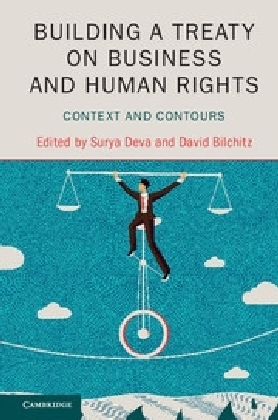
Building a Treaty on Business and Human Rights
Cambridge University Press (Verlag)
978-1-107-19911-8 (ISBN)
The calls for an international treaty to elaborate the human rights obligations of transnational corporations and other business enterprises have been rapidly growing, due to the failures of existing regulatory initiatives in holding powerful business actors accountable for human rights abuses. In response, Building a Treaty on Business and Human Rights explores the context and content of such a treaty. Bringing together leading academics from around the world, this book engages with several key areas: the need for the treaty and its scope; the nature and extent of corporate obligations; the role of state obligations; and how to strengthen remedies for victims of human rights violations by business. It also includes draft provisions for a proposed treaty to advance the debate in this contentious area and inform future treaty negotiations. This book will appeal to those interested in the fields of corporate social responsibility, and business and human rights.
Surya Deva is an Associate Professor at the School of Law of the City University of Hong Kong, and a Member of the UN Working Group on Business and Human Rights. Deva's primary research interests lie in business and human rights, corporate social responsibility, India-China constitutional law and sustainable development. He has published extensively in these areas, and has previously advised UN bodies, states, multinational corporations and civil society organisations on such matters. He is one of the founding Editors-in-Chief of the Business and Human Rights Journal. David Bilchitz is a Professor of Fundamental Rights and Constitutional Law at the University of Johannesburg and Director of the South African Institute for Advanced Constitutional, Public, Human Rights and International Law (SAIFAC). He is the Secretary General of the International Association of Constitutional Law and was elected as a member of the South African Young Academy of Science. He has written extensively in the field of business and human rights, and in 2013 he co-edited Human Rights Obligations of Business (Cambridge) with Surya Deva.
Introduction: putting flesh on the bone: what should a business and human rights treaty look like? David Bilchitz; Part I. Need for an International Treaty in a Historical Context: 1. Lessons from the UN Centre on transnational corporations for the current treaty initiative Khalil Hamdani and Lorraine Ruffing; 2. The value-added of a treaty to regulate transnational corporations and other business enterprises: moving forward strategically Penelope Simons; 3. Coherence, mutual assurance the rationale for a treaty Sheldon Leader; Part II. Principles and Politics Shaping the Treaty's Contours: 4. Principle and pragmatism in the elaboration of a comprehensive treaty on business and human rights Larry Catá Backer; 5. The need for a treaty: expectations on counter-hegemony and the role of civil society Daniel Maurício de Aragão and Manoela Carneiro Roland; 6. Scope of the proposed business and human rights treaty: navigating through normativity, law and politics Surya Deva; Part III. Nature and Extent of Corporate Human Rights Obligations: 7. Corporate obligations and a treaty on business and human rights: a constitutional law model? David Bilchitz; 8. Human rights, responsibilities, and due diligence: key issues for a treaty Robert McCorquodale and Lise Smit; 9. Human rights and global supply chains: is effective supply chain accountability possible? Justine Nolan; 10. Legalizing human rights due diligence and the separation of entities principle Radu Mares; Part IV. Role of States in Enforcing Human Rights Obligations: 11. Human rights legal liability for business enterprises: the role of an international treaty Carlos Lopez; 12. Regulatory obligations in a complex world: States' extraterritorial obligations related to business and human rights Sigrun Skogly; 13. The impact of a business and human rights treaty on investment law and arbitration Peter Muchlinski; Part V. Improving Access to Remedies for Victims: 14. Access to remedy: treaty talk and the terms of a new accountability accord Erika George and Lisa J. Laplante; 15. Making remedies work: envisioning a treaty-based system of effective remedies Beth Stephens; 16. The potential role of criminal law in a business and human rights treaty Shane Darcy; Conclusion: connecting the dots: how to capitalise on the current high tide for a business and human rights treaty Surya Deva.
| Erscheinungsdatum | 21.10.2017 |
|---|---|
| Zusatzinfo | Worked examples or Exercises |
| Verlagsort | Cambridge |
| Sprache | englisch |
| Maße | 157 x 235 mm |
| Gewicht | 870 g |
| Themenwelt | Recht / Steuern ► EU / Internationales Recht |
| Recht / Steuern ► Öffentliches Recht ► Verfassungsrecht | |
| Recht / Steuern ► Öffentliches Recht ► Völkerrecht | |
| ISBN-10 | 1-107-19911-5 / 1107199115 |
| ISBN-13 | 978-1-107-19911-8 / 9781107199118 |
| Zustand | Neuware |
| Haben Sie eine Frage zum Produkt? |
aus dem Bereich


